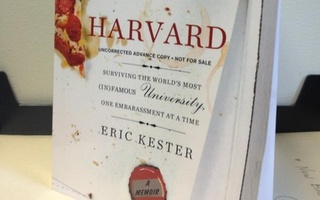“MUM SENT THE JET”
Harrington does not single out the Advocate in her satire. Most characters Penelope encounters are starring members in Harrington’s circus of Harvard freaks. Penelope goes to the Peter Pan themed comp party at the Advocate hoping to run into Gustav, the sexy German/Argentinean billionaire from her “Counting People” section, a Gen Ed that actually was taught at Harvard. Though she doesn’t see him at the Peter Pan party, Penelope eventually ends up running into Gustav when Emma begrudgingly brings her to a party at the “S---” Club, where Gustav is a member. Before Gustav pulls Penelope into a confusing after-hours-only romance, he sends her a ridiculous text: “Skiing in Japan for foreseeable future and Mum sent the jet early. Drinks when we get back? xx.” While absurd, it might not be farfetched coming from the exotic and well-groomed men I often see smoking cigarettes on the stoop outside Schoenhof’s Foreign Books. It is unclear why this club was the only proper noun modified in the novel, as Harrington changes nothing else to disguise the fact that she is seemingly referring to the Spee.
Harrington’s stereotypes are obviously off-putting to the people who identify with these institutions. But perhaps pushing against these preconceptions and reconciling them with self-images might actually be formative to those individuals who are parodied. Penelope’s experiences are not actually formative at all; her sense of self is limited and does not develop over the course of the novel. However, this lack of definition in Penelope’s character, alongside her frustrating agreeability, not only makes her a comic contrast to the hyper-ambitious extremes around her but also makes her the only character the reader can identify with. Every reader, explicitly targeted or not, can experience the simultaneously embracing and alienating experience of making friends and fitting in.
A LONESOME PACK
Dean of Freshmen Thomas A. Dingman ’67 understands the issue at hand in “Penelope.” He believes it is the responsibility of the Freshman Dean’s Office to provide spaces for interaction among the freshman class. He expresses frustration over the challenging layout of the Yard with its scant physical settings for social activities. “Hurlbut, Pennypacker and Greenough especially suffer from being away from things, but this summer we committed to converting a student suite in Pennypacker to a common room with a giant flat screen TV,” Dingman says.
Though Penelope and Harrington’s shared satirical outlook lends unusual sincerity to her novel, Harrington is hardly a duplicate of her hapless protagonist aside from both living in Pennypacker. I met her near Astor Place, around the corner from her office at The Huffington Post, where she has worked as a senior editor since graduating from the Columbia University Graduate School of Journalism. Stylish, cheery, and composed, Harrington chatted with me about the literary groundings of “Penelope” and about her experiences at Harvard.
While she made clear that her freshman experience was not exactly like Penelope’s, she did note some similarities. “Her life was basically more exciting and interesting than mine. She did more things…. I would go to the library, and I’d try to make friends with people there,” Harrington says with an air of self-deprecation. She also, like Penelope, often found herself hanging out on the steps outside Pennypacker.
Given Dingman’s worries, “Penelope” addresses valid concerns about the social challenges of freshman year. Furthermore, it challenges a prominently held view of the college experience and maturation more generally.
“THE LEGGINGS PARADOX”
Though Harrington wrote the manuscript of “Penelope” in four months, she edited it for two years, attempting to create a specific effect in opposition to the traditional American campus novel. She explained that she was reading a lot of 1930s British campus novels set at Oxford and Cambridge when she came up with the idea of Penelope. “Instead of viewing the educational experience as this kind of transcendentalist experience that deeply changes you as we do in America,” Harrington says, “in England it’s like, let’s go to five cocktail parties and be super embarrassing and funny.”
Harrington holds that Harvard is analogous to Oxbridge in American society, and it is particularly ripe for satire. “I had an experience that was much more like a linking together of absurd accidents than I did a transformative bildungsroman,” Harrington says. Her experience made it easier for her to identify with the madcap British campus novels.
Though parody may seem less powerful or profound than traditional bildungroman form, Harrington’s unique treatment is actually deeply insightful. “I purposefully made Penelope’s interiority shallow and socially expressed…. I think right or wrongly, people really think interiority is the vessel to profundity when you are reading,” Harrington says. “I’ve always felt that these novels about social experience are more elucidating than novels of interiority. Because we’re all the same, but there are so many quirks in the way people behave socially that are alienating and somehow extremely poignant even if you’re not particularly invested in the interiority of whoever’s there.” Indeed, the absence of interiority makes “Penelope” seem shallow, but it is precisely this shallowness that makes the novel uniquely illuminating. The lack of significance attached to individual events of the novel actually seems to assert how life, collegiate or otherwise, is less meaningful or transformative than we would like to think.
Though she did not write “Penelope” until after graduation, Harrington’s talent for comedic social commentary was evident in the fashion column she once wrote for the Crimson Arts section. At the end of each column, she would offer three tips for embracing or avoiding a certain fashion trend (e.g., “The Leggings Paradox Solved”). She may have thought her Crimson Arts career was a thing of the past, but in the spirit of tradition, I asked Harrington to offer three tips for incoming freshmen in this very issue. A few days after we met, she emailed me the following:
1) Your Harvard sweatshirt is not your friend. It is, in fact, your enemy and should be regarded as such.
2) Your freshman year is a time to meet new people! Sit with random students in Annenberg and ask them hypothetical questions such as, ‘Would you rather be married to Jon Bon Jovi or live alone forever?’ Talk about endearing.
Read more in Arts
Gersht’s ‘History’ of Violence in MFA ShowRecommended Articles
-
PenelopeIn the whimsical movie “Penelope,” title character Penelope Wilhern, played by Christina Ricci, seems to have it all. As the
-
History of Science Rethinks Sophomore TutorialThe History of Science department unveiled a revamped sophomore tutorial this semester featuring virtual interviews, student-driven lectures, and a chance for students to engage in independent research.
-
 Which Books About Harvard Are Worth Reading?
Which Books About Harvard Are Worth Reading? -
"Penelope" is an Exciting OdysseyDirected by Jacob A. Brandt ’14, "Penelope", which runs from April 25 to May 3 on the Loeb Mainstage, gleefully collides the sublime with the ridiculous, transporting a mainstay of world literature to a banal, seedy modern-day setting. In the able hands of its four main actors, the Harvard-Radcliffe Dramatic Club’s production pulls off the play’s comic elements without passing over the sense of unease at the play’s heart.
-
 Athlete of the Week: Harrington Makes 22 Saves in Big Weekend for Women's Water Polo
Athlete of the Week: Harrington Makes 22 Saves in Big Weekend for Women's Water Polo













